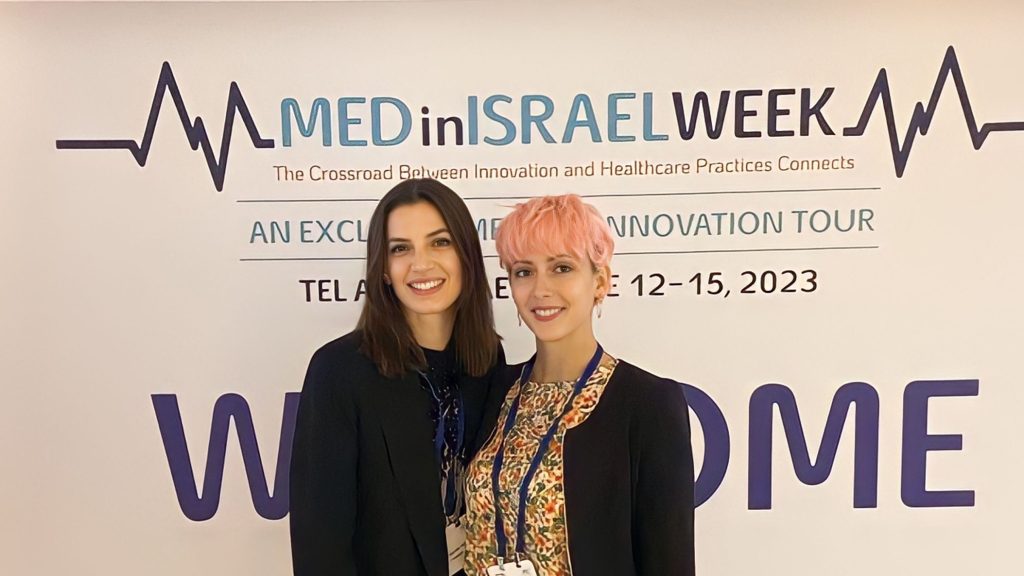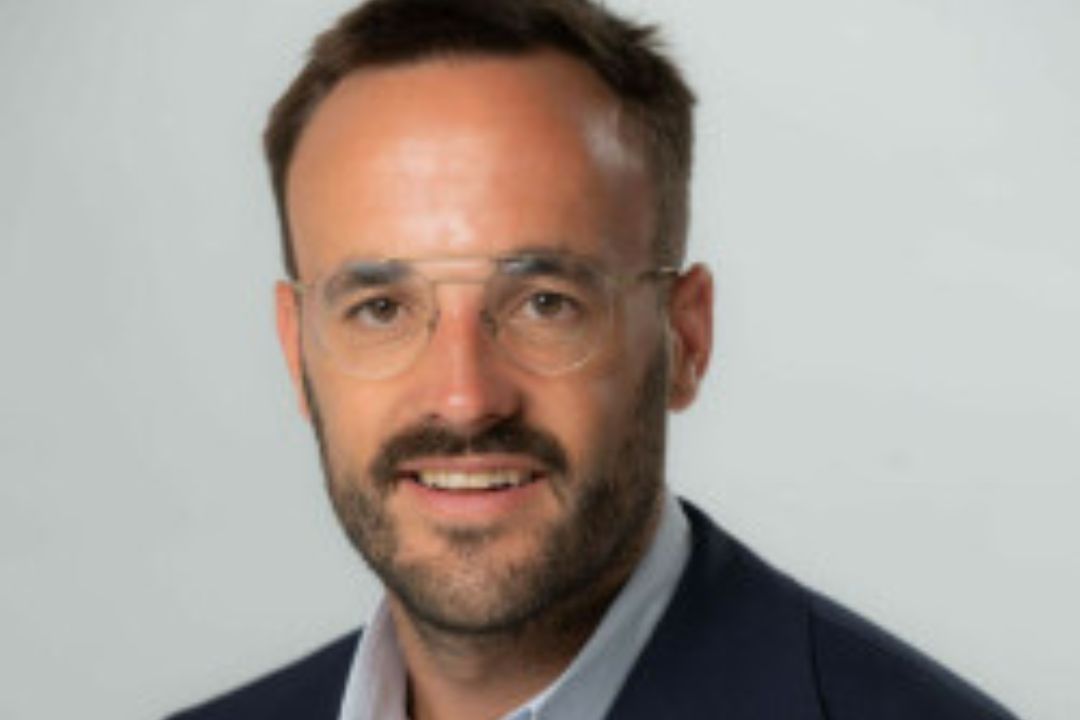6th July 2023
Dr. Aniko Fejes (Collaboration Lead at EIT Health Austria) and Melanie Hartl (Entrepreneurship Lead at EIT Health Austria) are constantly looking for new topics and ideas driving health innovation in Austria. Last week, they hit the road to get inspired by the health community in Israel. The ARC Summit and the MEDinISRAEL Week presented the perfect opportunity, EIT Health Partner HealthIL and the EIT Hub Israel provided the perfect hosts. In this interview, they share their observations and learnings.
Q: What brought you to Israel?
Melanie Hartl: We came to Israel driven by a strong interest in comprehensively understanding the Israeli healthcare system and its vibrant start-up scene. Our focus was on the structure, policies, and the role of innovation within the healthcare system. Another aim was to explore the relationships between key stakeholders such as patients, insurance companies, hospitals and governmental bodies, and the various drivers of innovation.
Israel has an extremely dynamic start-up scene with a track record of scaling fast, strategically and effectively. By exploring and engaging with the different stakeholders, we aimed to learn from their success and provide valuable insights into the factors that contribute to the success of the Israeli start-up ecosystem.
Q: Which project that you met impressed you the most and why?
Dr. Aniko Fejes: What I found most fascinating was how the infrastructure is built up to enable innovation and data use at hospitals AND coming from hospitals. We had the privilege to visit Sheba Medical Center, one of the most innovative Israeli institutions in this category. Amongst other mind-blowing projects, they built up an ADAMS – “Ask, Discover, Act, Measure, Share” – Center to leverage data to drive performance on diagnostics, treatment, and research. People and processes are layered around the technology to use real-world data from Sheba. The clinicians and researchers are driving the use of the ADAMS platform – combining Big Data and AI, using patient information – to solve their everyday problems in the clinics or even on an operational level by creating and implementing innovative and effective solutions high-speed! I wish for such a solution to be implemented all around the globe!
Melanie Hartl: As a data enthusiast, seeing first-hand a practical way to bring together diverse datasets across the hospital to enhance processes, support decision-making, and improve the quality of care provided by Sheba Medical Center was fascinating. In addition, Sheba’s strong industry connections enable them to leverage innovation from the network and directly integrate them into the infrastructure. They established the ARC innovation platform as their own worldwide collaborative platform of leading healthcare institutions, start-ups, academia and investors. It allows for the sharing of expertise, resources, and innovative solutions. The hub operates on a partnership model, collaborating with start-ups and commercial organisations that contribute their clinical expertise and data alongside advanced technological capabilities.
Q: Speaking of innovation. Any new solution you encountered that you would like to share with our readers?
Dr. Aniko Fejes: Israel invests a great deal of resources into healthcare innovation and digital health. For example, they have a Digital Healthcare Division at the Israel Ministry of Health, they implemented innovation managers and internal innovation hubs at hospitals, and they support the start-up scene not only monetarily but with infrastructural support, to list a couple. It has definitely paid off!
Melanie Hartl: Yes, it has paid off big time! We have encountered a great number of solutions. It appears that they pop up at every corner and that innovation is a mindset of people. Within the hospital setting, they are currently testing/demoing the use of advanced clinical devices that enable direct monitoring of patients in their own homes. It allows hospitals to maintain constant communication with patients, intervening promptly in the event of a fall or abnormal values. Another solution that caught my attention involves the utilisation of virtual reality to aid patients in their rehabilitation process and provide an escape from the hospital environment. This technology is particularly beneficial for geriatric patients, offering them a chance to immerse themselves in an alternative world. Seeing all of this in practice was an impressive experience.
Q: Being so far from home, I’m sure you made some interesting non-technological observations during your days?
Melanie Hartl: I found the culture and business environment to be incredibly welcoming and open. People are very direct, expressive and readily engage in conversations. I was impressed by the level of enthusiasm and eagerness to connect with others. The business culture, particularly in the start-up scene, has a vibrant energy with a getting-things-done attitude.
Dr. Aniko Fejes: I absolutely agree. The networking culture is extremely dynamic! To quote someone from the ecosystem there: “People are impatient – in a good way!” They don’t like to sit and listen to too-long presentations or panel discussions because they think the actual work gets done during networking. I experienced a very action-oriented attitude that contributes to the speed of innovation there. They talk to each other, come up with ideas and connect the dots. This was also the case for the great people at EIT Health Partner HealthIL and the EIT Hub Israel, who were guiding us through the local network and knew exactly who to introduce us to. We couldn’t be more thankful for that!
Q: Last but not least, what are the Top 3 learnings from your visit that you’d like to share with the Austrian health innovation community?
Melanie Hartl:
1 – As a founder you have to be connected to be successful! You need to find the stakeholders that can help you speed up the time to market whether it’s access to data for AI models, patients to test your solutions, clients or funding. You can’t do it alone so, find the right stakeholders!
2 – Nowadays, healthcare personnel are under extreme pressure due to insufficient staffing, long working hours and time spent on tasks that could be easily taken over by tools such as reporting. In Austria, we need to develop an infrastructure that enables hospital staff to USE innovative solutions in practice. Additionally, it is crucial to involve the staff in the development and design of these solutions, ensuring that their valuable input and expertise are considered throughout the process. Innovation needs to be put at the top level of the organisation and be interconnected between clinicians and businesses.
3 – The key to driving innovation is access to health data! Only if the data is readily available in a safe and secure format, we can be innovators. The easiest way to do that is to use the data within its own environment such as Sheba has data scientists in-house to develop data insights and solutions. Hospitals need to have a more active role in implementing solutions!
Dr. Aniko Fejes:
1 – Be impatient in order to speed up! Founders get stuck in bureaucracy very easily! There are things we cannot change right now in the infrastructure, but if we are prepared for it and we keep an agile attitude, we can get through these hurdles as well – and hopefully quicker to reach the results we want! Keep networking relentlessly, it pays off!
2 – We have to build up an enabling infrastructure for founders in Austria, also for innovation coming out of hospitals. There is definitely support already, and we also have to keep it in mind, that a lot of times the one who has the idea – let´s say a researcher – is not always the person who would lead their solution to the commercial success. We have to tap into other forms of support to foster ideas reaching the ground.
3 – The players in healthcare innovation have to collaborate with each other much more closely. The system is still very fragmented. To distinguish ourselves not only as the most liveable city in the world, but also as one of the centres of excellence for health innovation – and I´m dreaming big here – we have to be more united in implementing solutions, accessing and exchanging health data and resources.
Thank you so much for the interview.
Curious about the innovation community in Israel? Find out more about the EIT Hub Israel here and visit the website of the innovation hub at the Sheba Medical Center here.
Europe's top health start-ups take centre stage: EIT Health Catapult winners are revealed at HLTH Europe

2025 Catapult programme winners announced.
Finding Europe’s next healthtech leaders: Insights from Antoine D’Hollander

Insights from Antoine D’Hollander, Capricorn Partners.
EIT Health supports 17 promising deep tech start-ups bridge the ‘Valley of Death’

Providing start-ups with the right support.